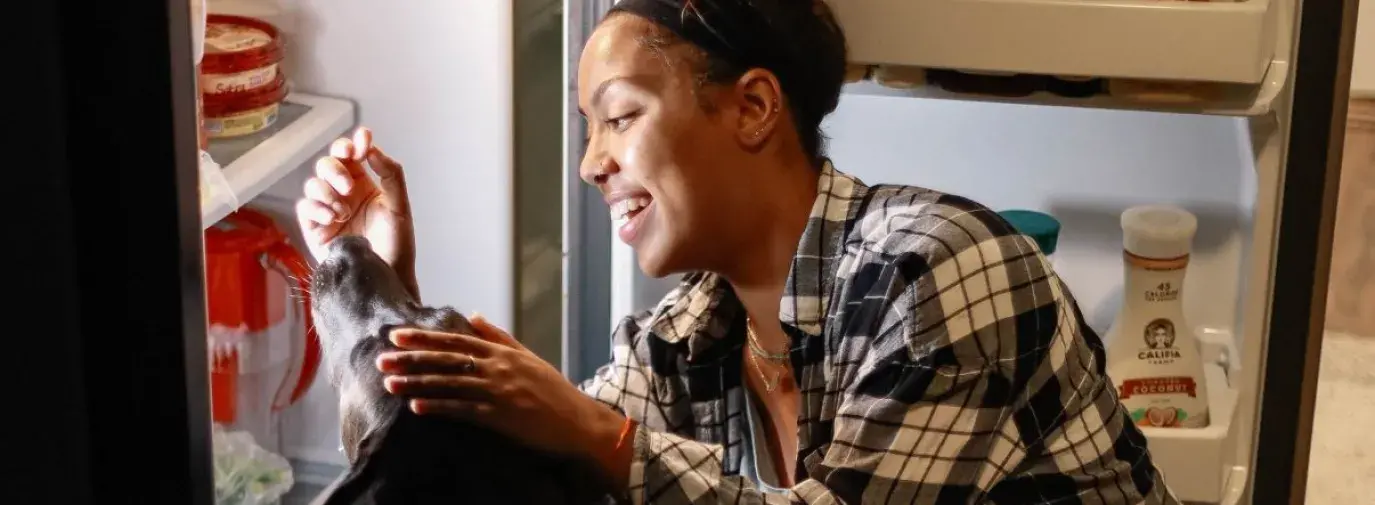
Green America’s Cool It! campaign tackles the climate disaster hiding in our refrigerators by urging companies to eliminate the use of greenhouse gases called HFCs (hydrofluorocarbons).
HFCs are potent gases that leak out of refrigerators and air conditioners into the atmosphere and escalate the climate crisis. These refrigerant gases regularly leak out of poorly maintained equipment and through irresponsible disposal of appliances.
Appliances have other hazardous components besides HFCs that can also pose threats to the environment and communities if (and when) they leak out.
Refrigerants called HFCs are 9,000 to 12,000 times more potent than CO2
Fortunately, as an alternative to buying a new refrigerator, there are numerous ways to safely manage that old fridge and protect the environment.
What should I do with my old refrigerator or AC?
My fridge is old. Do I need a new one?
- The most eco-friendly thing to do is to keep what you have working efficiently. If your fridge is more than 20 years old, use energy star’s Flip Your Fridge calculator to see how much electricity you could be saving by switching to a more efficient model.
- Move your fridge a few inches away from walls. This will help hot air from the compressor disperse, making it easier for the appliance to stay cool. You can place a board behind (and on the side if it’s in a corner) to keep it from scooting back into the walls.
- Vacuum the coils in the back of your fridge (or across the bottom front, behind a grille) at least annually.
- Keep it full—if you’ve got chronically bare shelves, add some jugs of water—then the fridge only has to cool the water when you add it, instead of cooling all the warm air that rushes in every time you open the door.
- Make sure it’s functioning well. Your fridge doesn’t have a check engine light, so keep a thermometer inside if it doesn’t have one built-in, to make sure you’re not in the danger zone (over 40 degrees). For less than $10 you will potentially save hundreds in food or fridge replacement costs.
- Be aware of the signs of a coolant leak, which could not only compromise the freshness of your food but your health as well. Warning signs that you may have a leak: food feels warm; electric bill is unusually high; the motor runs constantly; odd musty smell; a prolonged leak could cause physical symptoms such as headache, nausea, fainting, or other inexplicable symptoms.
- If your fridge makes loud or prolonged sounds, that’s another way to know to call for repairs.
My fridge isn’t working right, is all lost?
- When hiring a company or technician to make repairs in your home (or car A/C) make sure they are certified under Section 608 (or 609, for motor vehicles repairs) from the Clean Air Act.
- Renters, urge your landlord to hire section 608 certified technicians and create a schedule for monitoring leaks on your property annually.
- If you suspect that whomever you hire is venting out gases instead of responsibly containing them, you can report it on the EPA’s tip line. If the refrigerant is being properly recovered, your technician will be using a machine and a reusable cylinder to capture the gas. If the technician is emptying the gas into a plastic jug or no container at all, it’s not being recovered properly and is venting out into the air.
My fridge is beyond repair, what should I do?
- Check with your electric utility to see if it sponsors a turn-in program that will pay you for your old appliance. Many do!
- Use the EPA’s Responsible Appliance Disposal Program to find retailers and utility companies who will dispose of your old appliance. These partners send appliances to certified technicians to responsibly remove the substances.
- Do not attempt to cut any refrigerant line yourself or remove items like the compressor, which will result in venting out the gases.
- When you get a new fridge, get one that’s energy star-rated, a high-efficiency ranking from the EPA. Fridges with this rating are nine percent more efficient than the federal standard for that year and are sold by most major brands. energy star also certifies A/C units and other appliances. The Flip Your Fridge Calculator can tell you how much you could save by replacing your fridge with an energy-efficient one based on its size, shape, age, and your electricity rate.
I own fridges and A/C units at my business, what sustainability steps should I take?
- Commit to monitoring leaks on a quarterly or annual basis.
- Develop a plan to make a quick repair if you detect a refrigerant leak, and make sure to contract with technicians who are Section 608 certified under the Clean Air Act.
How can my business improve refrigerant management?
Tell Walmart to Cool It! For Climate
How you choose to chill is up to you, but it's important to consider your HFC impact and think about quick fixes to stay sustainable before buying a new refrigerator.







